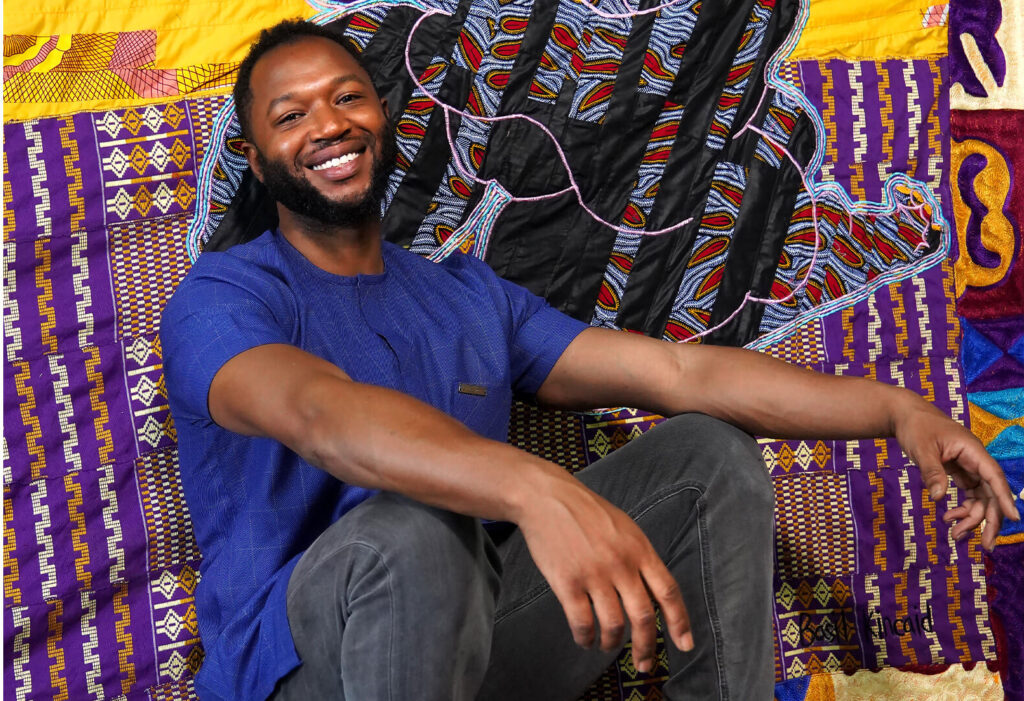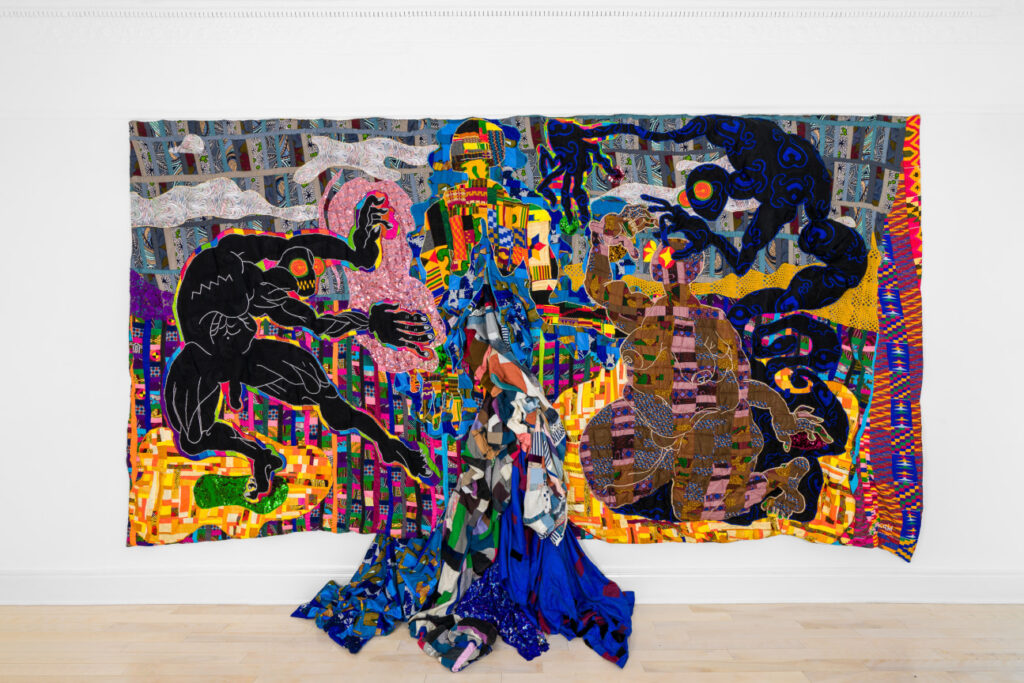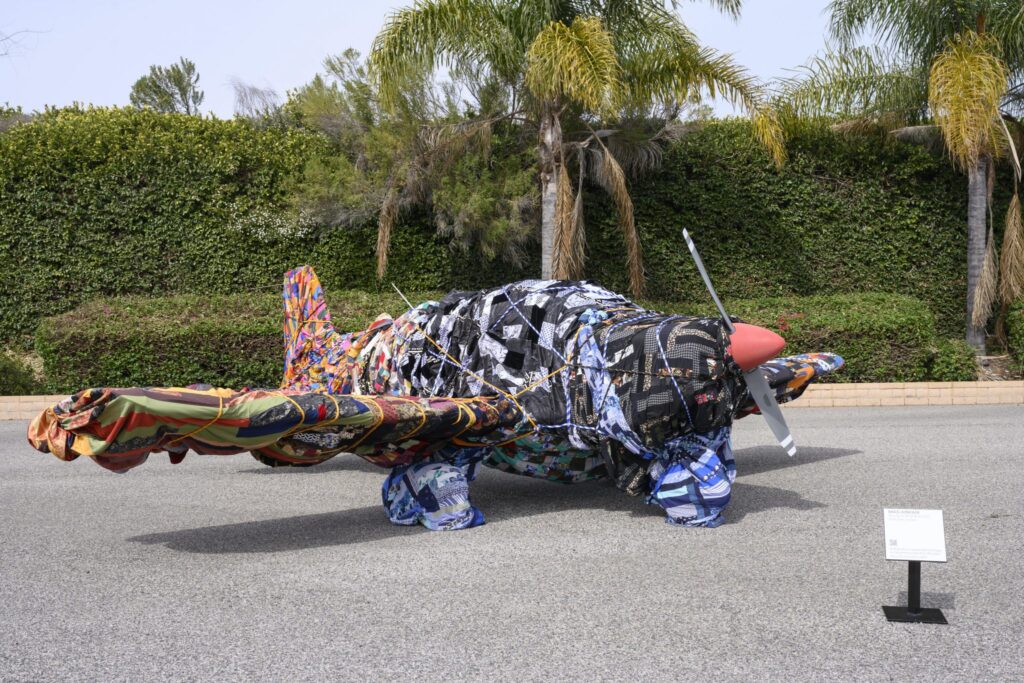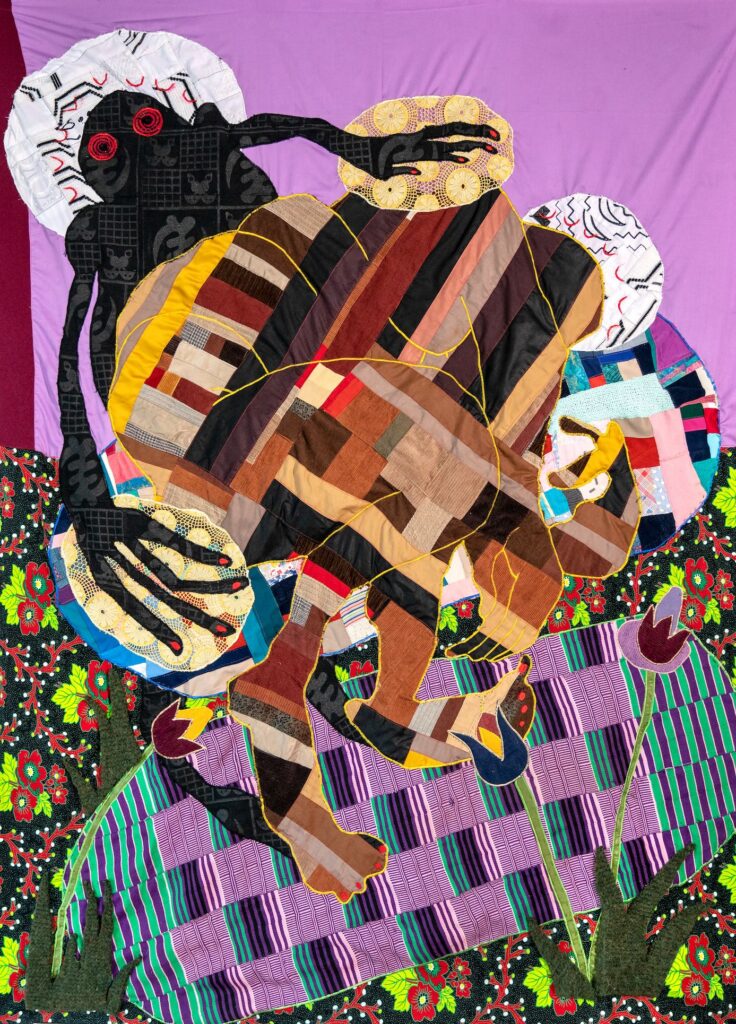The Frank Stella You Thought You Knew
You may know Frank Stella from the brightly colored, shaped canvas paintings in his Protractor series from the late 1960s to early 1970s. However,...
Marva Becker 11 July 2024
8 April 2024 min Read
Basil Kincaid (b. 1986) is an American contemporary artist. His multimedia work showcases the potential of repurposed materials while reflecting on both traditional art forms and contemporary issues like racial identity, materiality, and mental health.
Themes of community, tradition, and heritage are central to Basil Kincaid’s work. The Kente cloth, a handwoven fabric from Ghana, is one of the materials Kincaid utilizes to animate these ideas. Kente used to symbolize royalty; it now makes up garments and accessories worn day-to-day, on special occasions, and during traditional ceremonies. How Kente becomes an identity marker is a question Kincaid is concerned with, particularly after he received artistic training in Ghana.

Basil Kincaid in his studio. Hauser & Wirth.
African-American quilts encapsulate a culture of resilience. Kincaid approached it from a socio-economic perspective and from his family tradition, which has stretched over seven generations. “Quilting, within the Black cultural tradition, has always served as a revolutionary space of joy, courage, and community in direct contrast to social and financial subjugation.” He also noted, “It’s a way to honor my predecessors while addressing the questions and concerns of where I am—we are—today. It’s a way towards restoring and reconstructing with the resourcefulness born within us.”
Quilting was remarkably significant for Black women. Traditionally practiced by women with no formal training, the activity composes a unique artistic expression, helps establish Black feminism, and is sometimes a means for women to maintain economic independence. Kincaid reintroduced the rich tradition as a male artist from academia. He reaffirmed the crucial role of women in it while letting that broader scope of culture interface with his own life experience.

Basil Kincaid, River, Frog and Crescent Moon, 2022, quilt, Albertina Modern, Vienna, Austria.
An exemplary installation by Kincaid is Dancing the Wind Walk, featuring an airplane enveloped in his signature quilts. This artwork serves as a poignant symbol of aviation’s capacity to transcend boundaries, commemorating journeys, transitions, and transformation. Simultaneously, it celebrates the historical trajectory of African-American quilting traditions and the contemporary voyage undertaken by the fabric fragments, originating from West Africa and converging in the United States, to fuel Basil Kincaid’s artistic expression.

Basil Kincaid, Dancing the Wind Walk, 2023, quilt, Frieze, Los Angeles, LA, USA.
In the context of both Lullaby and River, Frog and Crescent Moon, it is necessary to highlight the black, supernatural figures as a recurring motif within Kincaid’s artwork. Rather than comparing these figures to something monstrous, the artist sees these monster-like beings as protective and creative reflections of the inner self. In his own words: “I’ve been thinking a lot about monstrosity. What may seem like a monster to somebody else—well, maybe it’s good that it’s scary to some people because it is meant to protect someone else.”

Basil Kincaid, Lullaby, 2021, quilt, Kavi Gupta Gallery, Chicago, IL, USA.
Basil Kincaid’s work investigates the role of tradition in our contemporary experience. With an assortment of mediums, he carefully balances artistic expression with a keen eye for social sentiments and a love of creativity.
Annie Armstrong, “Meet Basil Kincaid, the Artist-Quilter Making a Splash in Miami Beach,” artnet, December 5, 2023, https://news.artnet.com/art-world/meet-basil-kincaid-miami-beach-2402768.
Basil Kincaid, “Art,” https://basilkincaid.art/works/fiber.
“Basil Kincaid: Lullaby,” Kavi Gupta Gallery, https://kavigupta.com/artists/76-basil-kincaid/works/9638-basil-kincaid-lullaby-2021/.
Ebony O. Lumumba, “Patchwork Politics: Black Women Stitching Their Own Identities in Eudora Welty’s Writing,” Women’s Studies 53, no. 2 (2024). 169-185.
Julie Schneider, “Art in Focus: The Symbolic Nature of Basil Kincaid’s Quilt-Based Work,” The Center Magazine, April 26, 2023,https://www.rockefellercenter.com/magazine/arts-culture/artist-basil-kincaid-at-rockefeller-center/.
Klaus Albrecht schröder and Angela Stief, “Basil Kincaid; The River,” in The Beauty of Diversity, edited by Klaus Albrecht schröder and Angela Stief. Vienna: Albertina Modern, 2024.
“Now Playing: Basil Kincaid, “Dancing the Wind Walk”,” FRIEZE, February 16, 2023, https://www.frieze.com/event/now-playing-basil-kincaid-dancing-wind-walk.
DailyArt Magazine needs your support. Every contribution, however big or small, is very valuable for our future. Thanks to it, we will be able to sustain and grow the Magazine. Thank you for your help!